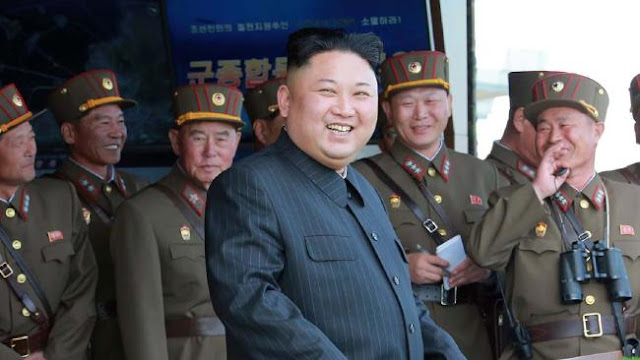 |
| North Korean leader Kim Jong-un. |
US President Donald Trump said a major conflict with North Korea is possible in the standoff over its nuclear and missile programs, but he would prefer a diplomatic outcome to the dispute.
Nonetheless, Trump said he wanted to peacefully resolve a crisis that has bedeviled multiple US presidents, a path that he and his administration are emphasizing by preparing a variety of new economic sanctions while not taking the military option off the table.
“We’d love to solve things diplomatically but it’s very difficult,” he said.
Trump lavished praise on Chinese President Xi Jinping for Chinese assistance in trying to rein in North Korea. The two leaders met in Florida earlier this month.
“I believe he is trying very hard. He certainly doesn’t want to see turmoil and death. He doesn’t want to see it. He is a good man. He is a very good man and I got to know him very well.
“With that being said, he loves China and he loves the people of China. I know he would like to be able to do something, perhaps it’s possible that he can’t,” Trump said.
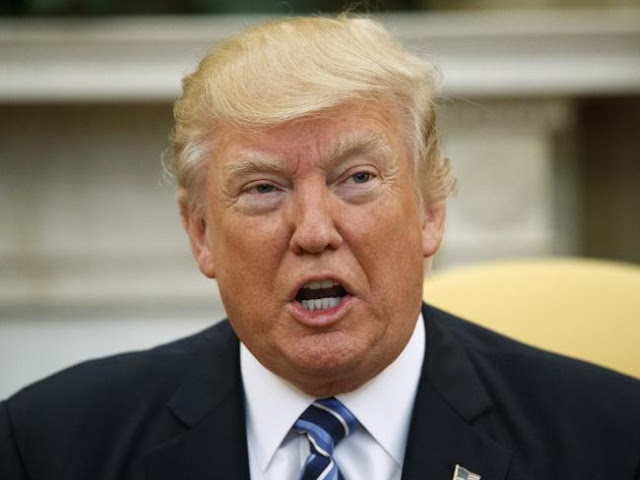 |
| President Donald Trump speaks in the Oval Office of the White House. |
Trump spoke just a day after he and his top national security advisers briefed US lawmakers on the North Korean threat and one day before Secretary of State Rex Tillerson will press the United Nations Security Council on sanctions to further isolate Pyongyang over its nuclear and missile programs.
The Trump administration on Wednesday declared North Korea “an urgent national security threat and top foreign policy priority.” It said it was focusing on economic and diplomatic pressure, including Chinese cooperation in containing its defiant neighbor and ally, and remained open to negotiations.
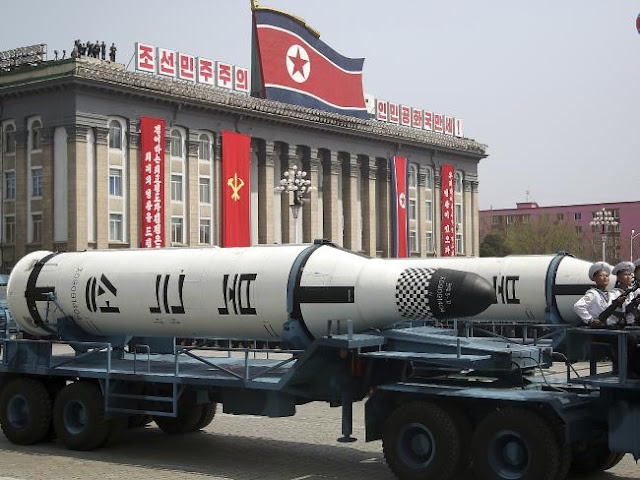 |
| A submarine-launched ballistic missile is displayed in Kim Il-sung Square during a military parade in Pyongyang, North Korea. |
US officials said military strikes remained an option but played down the prospect, though the administration has sent an aircraft carrier and a nuclear-powered submarine to the region in a show of force.
Any direct US military action would run the risk of massive North Korean retaliation and huge casualties in Japan and South Korea and among U.S. forces in both countries.
Trump, asked if he considered North Korean leader Kim Jong Un to be rational, said he was operating from the assumption that he is rational. He noted that Kim had taken over his country at an early age.
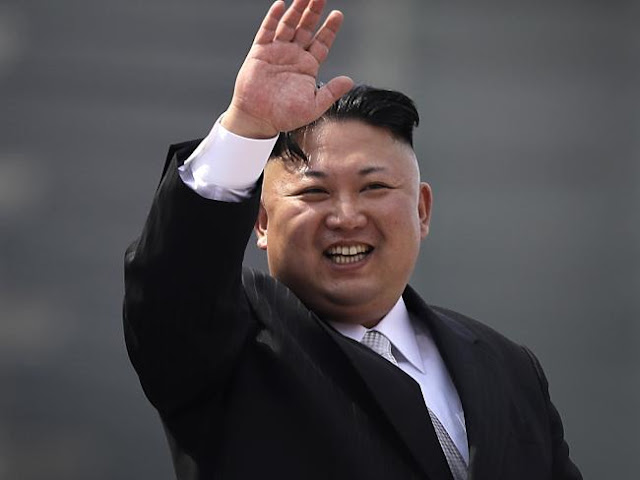 |
| North Korean leader Kim Jong Un waves during a military parade in Pyongyang. |
“I’m not giving him credit or not giving him credit, I’m just saying that’s a very hard thing to do. As to whether or not he’s rational, I have no opinion on it. I hope he’s rational,” he said.
Trump, sipping a Coke delivered by an aide after the president ordered it by pressing a button on his desk, appeared to rebuff an overture from Taiwan President Tsai Ing-wen, who told Reuters a direct phone call with Trump could take place again after their first conversation in early December angered Beijing.
China considers neighboring Taiwan to be a renegade province.
“My problem is that I have established a very good personal relationship with President Xi,” said Trump. “I really feel that he is doing everything in his power to help us with a big situation. So I wouldn’t want to be causing difficulty right now for him.”
“So I would certainly want to speak to him first.”
S KOREA TO PAY FOR MISSILE SYSTEM
President Trump told Reuters he will either renegotiate or terminate what he called a “horrible” free trade deal with South Korea and said Seoul should pay for a US anti-missile system that he priced at $1 billion.
In an interview with Reuters, Trump called the five-year-old trade pact with South Korea “unacceptable” and said it would be targeted for renegotiation after his administration completes a revamp of the North American Free Trade Agreement (NAFTA) with Canada and Mexico.
He blamed the US-Korean trade deal, known as KORUS, on his 2016 Democratic presidential election opponent, Hillary Clinton, who as secretary of state promoted the final version of the trade pact before its approval by Congress in 2011.
“It is unacceptable, it is a horrible deal made by Hillary,” the Republican Trump said. “It’s a horrible deal, and we are going to renegotiate that deal or terminate it.”
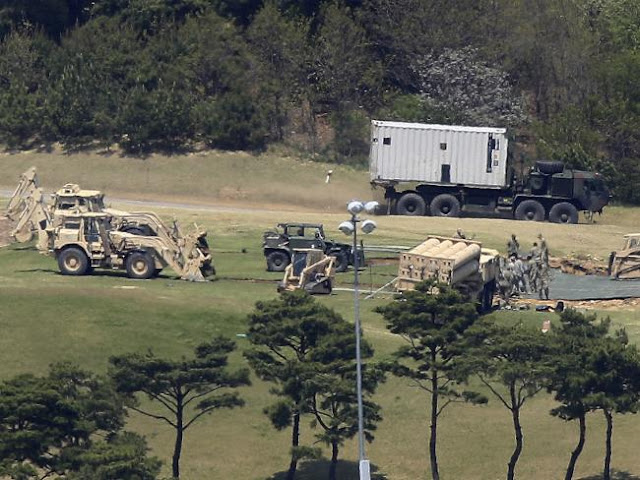 |
| US Army soldiers install their missile defense system called Terminal High-Altitude Area Defense, or THAAD, at a golf course in Seongju, South Korea. |
KORUS was initially negotiated by the Republican administration of President George W. Bush in 2007, but that version was scrapped and renegotiated by President Barack Obama’s Democratic administration three years later.
The U.S. goods trade deficit with South Korea has more than doubled since KORUS took effect in March 2012, from $13.2 billion in 2011 to $27.7 billion in 2016, according to U.S. Census Bureau data.
Trump said the Terminal High-Altitude Area Defense (THAAD) missile system now being deployed in South Korea to defend against a potential missile attack from North Korea would cost about $1 billion and questioned why the United States was paying for it.
“I informed South Korea it would be appropriate if they paid. It’s a billion dollar system,” Trump said. “It’s phenomenal, shoots missiles right out of the sky.”
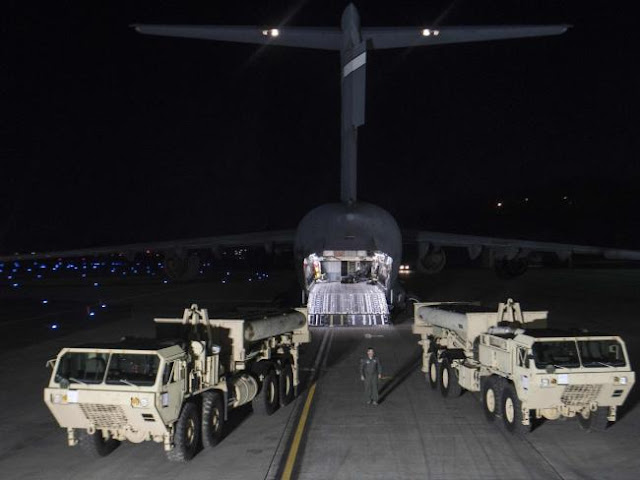 |
| US Forces in Korea as they continue progress in fulfilling the South Korea-US alliance decision to install a Terminal High Altitude Area Defense, or THAAD, on the Korean Peninsula. |
N KOREA APPEALS FOR SUPPORT
NORTH Korea has appealed to Southeast Asian countries for support in its row with the United States to prevent what it warned could be a “nuclear holocaust”.
In a letter to the Association of Southeast Asian Nations’ secretary-general, North Korean Foreign Minister Ri Yong-ho warned the situation on the Korean Peninsula was “reaching the brink of war” because of Washington’s actions.
He urged the ASEAN chief to inform the 10-nation organisation’s foreign ministers “about the grave situation” on the peninsula “and give them a proper proposal”, while criticising at length US-South Korean military exercises.
Tensions have soared in the region in recent weeks in the wake of a series of North Korean missile tests and tough rhetoric from Washington on the isolated nation’s rogue weapons program.
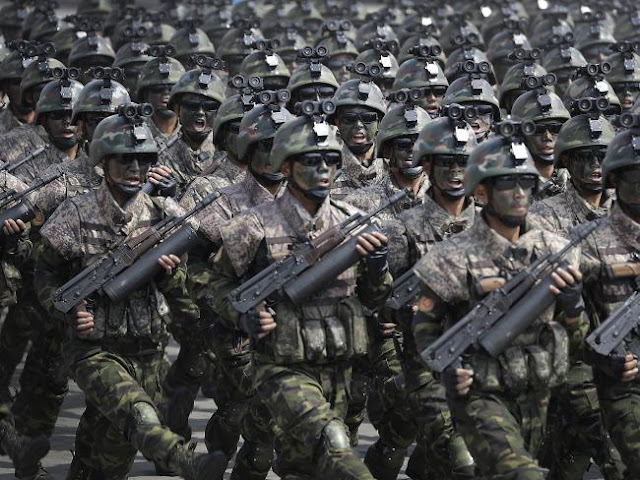 |
| Commandoes march across the Kim Il Sung Square during a military parade in Pyongyang. |
“I express my expectations that ASEAN which attaches great importance to the regional peace and stability will make an issue of the US-South Korean joint military exercises at ASEAN conferences from the fair position and play an active role in safeguarding the peace and safety of Korean Peninsula,” the letter said.
North Korea is known to have close ties with some ASEAN members, including Cambodia and Laos.
THREAT TAKEN SERIOUSLY: TURNBULL
Prime Minister Malcolm Turnbull has responded to Pyongyang’s latest threats, saying the Australian government is taking the possibility of a nuclear attack very seriously.
“There is the possibility and the risk that North Korea could launch an attack on its neighbours,” Mr Turnbull told 3AW host Neil Mitchell this morning.
“That is the reason why there is so much effort being put into seeking to stop this reckless and dangerous conduct by the North Korean regime,” he said.
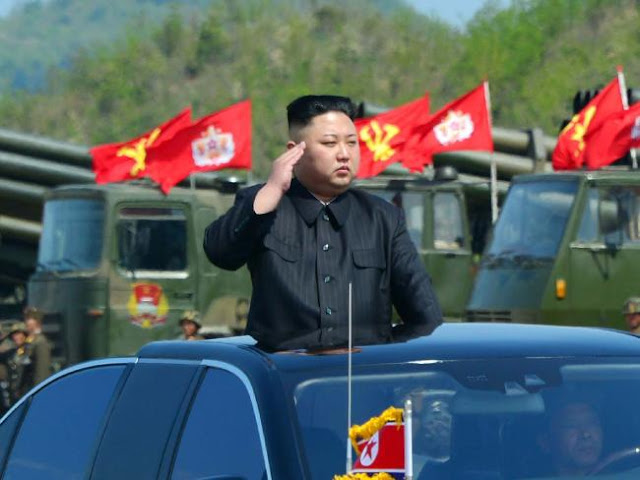 |
| Kim Jong-Un attending the combined fire demonstration of the services of the Korean People's Army. |
When pushed on the possibility that the world was headed for nuclear war, Mr Turnbull said how other countries responded if North Korea carried out a nuclear attack would “depend on events”.
“At this stage, obviously, they’ve not carried out those threats,” he said.
“Their threats can appear to be theatrical and over the top and the subject of satire but I can assure you my government takes the threat of North Korea very, very seriously.”
The Prime Minister said “extensive sanctions” and pressure on China to intervene were Australia’s primary response to the growing threat that North Korea could develop a long-range ballistic missile capable of reaching our shores within two years.
 |
| U.S. Navy, the aircraft carrier USS Carl Vinson (CVN 70), foreground, transits the Philippine Sea, ready to act. |
“As threats evolve our response to them would evolve,” Mr Turnbull said.
“But right at the moment we do not deploy a THAAD - this is the anti-missile system that is being deployed in South Korea - we do not deploy that in Australia.
“Nor do we see the need to do so.
“What we are doing in term of stopping North Korea is continuing our pressure on the regime through extensive sanctions, economic sanctions, which are designed to bring North Korea to its senses and urging North Korea’s neighbours to bring its considerable leverage to bear on North Korea to change its ways.
“It has not been enough to date because ... the reckless threats and conduct by the North Korean regime has continued.”
Mr Turnbull said he was still “quietly confident” the Chinese would act to rein in North Korea.
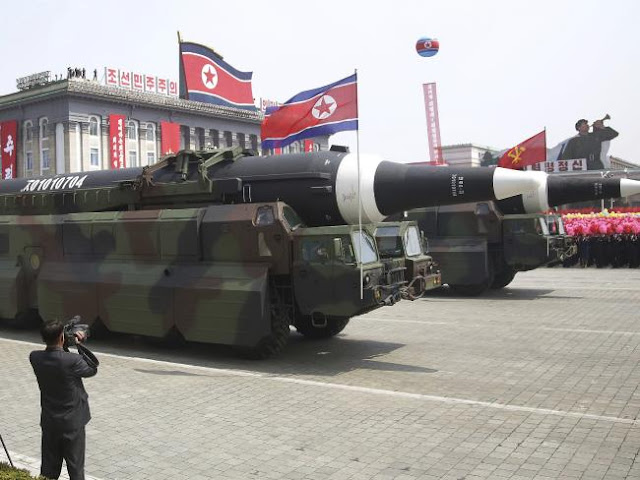 |
| In what military experts say appears to be a North Korean KN-08 Intercontinental Ballistic Missile (ICMB) is paraded across Kim Il Sung Square. |
A statement released at the end of an ASEAN leaders’ summit in Laos last year expressed “serious concern” over North Korea’s nuclear testing and called on it to abide by relevant UN Security Council resolutions meant to curtail its atomic program.
Ri’s letter appeared to be a highly unusual move. A Southeast Asian diplomat said that, as far as he could recall, it was the first time North Korea had written a letter seeking ASEAN’s help on the issue.
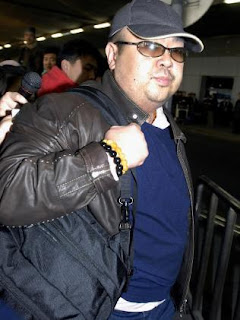 |
| Kim Jong-nam was assassinated at an airport in Malaysia. |
South Korea has blamed Pyongyang for the killing, accusing its agents of using a banned nerve agent.
Ri wrote in the letter that the annual US-South Korea military exercises justified Pyongyang’s decision to develop its own nuclear weapons.
“It is a fact clear to everyone that when they deploy the means of nuclear strike that can drive the Korean Peninsula into a nuclear holocaust in just seconds ... the nature of such exercises can in no way be defensive,” the letter said.
Washington has deployed an aircraft carrier strike group to the Korean peninsula amid signs the North could be preparing for a sixth nuclear test.




Post a Comment